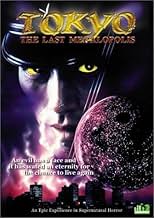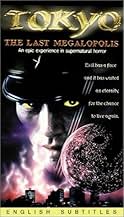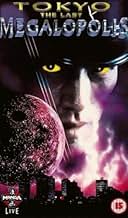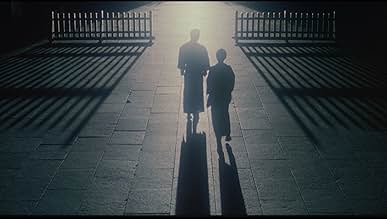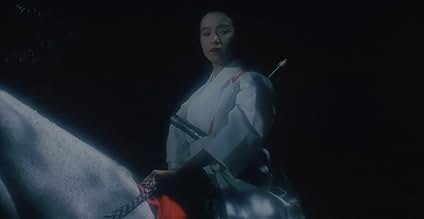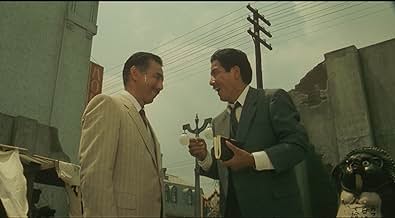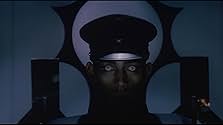Ajouter une intrigue dans votre langueA demonic reincarnation of a Japanese general from the 10th century appears in the early 20th century Tokyo with a mission to destroy the blooming city.A demonic reincarnation of a Japanese general from the 10th century appears in the early 20th century Tokyo with a mission to destroy the blooming city.A demonic reincarnation of a Japanese general from the 10th century appears in the early 20th century Tokyo with a mission to destroy the blooming city.
- Réalisation
- Scénario
- Casting principal
- Récompenses
- 2 nominations au total
Jun'ichi Ishida
- Yoichiro Tatsumiya
- (as Junichi Ishida)
Bunshi Katsura VI
- Shigemaru Kuroda
- (as Sanshi Katsura)
Tamasaburô Bandô
- Kyoka Izumi
- (as Tamasaburo Bando)
Avis à la une
"Teito monogatari" is one of the best Japanese movies in history, based on the novel of the same name, the script achieves a perfect dark fantasy and horror story, which is made up of historical elements mixed with folklore and mythology. The performances are outstanding, the production design is first class, the soundtrack is hypnotizing and the special effects are a complete success, obviously with all the 80's charm of the stop-motion technique to bring various creatures to life, it is also noticeable the influence of Ray Harryhausen in different designs. A classic that encompasses various film genres!
To this day, no film featuring King Kong has ever looked as good or been as thrilling as the original of 1933 with its stop-motion animation and black and white presentation. The overproduced green screen falsehood of Zack Snyder's '300' is laughably bad, and all the intended grandiosity and enormous budgets of the Marvel Cinematic Universe can't overcome the bland artifice (of film-making and storytelling like) that continues to grow ever more tiresome. In turn, whatever else might be true of this 1988 tokusatsu flick and the story it has to tell, it shouldn't be at all surprising that the effects extravaganza of the 80s is incredible, holding up better than can be said for many titles - with all the supposed advances in techniques and technology they may claim - that have followed in the past thirty-plus years. The post-production visuals that are added to filmed footage, less than seamless though they may be, look better and more believable than the preponderance of modern computer-generated imagery that major Hollywood studios can churn out. The instances of stop-motion animation are most welcome, a sight for sore eyes that is deeply missed in more recent years. And as the vast majority of all the visions to greet us in 'Tokyo: The last megalopolis' are practical effects and stunts, with props and creatures and set pieces that were physically fabricated in a shop and assembled for this production, the gratifying result is a gnarly, imaginative bonanza that all this time later continues to dazzle while its "state of the art" successors tend to wallow in the rapid obsolescence of their hollow digital contrivance.
It's just not about the flashiest aspects of the visual experience, either. Alongside real filming locations, physically constructed sets, and other tangible creations, at all times lighting and shadow are employed in a fashion that is natural and meaningful. The crisp, vivid contributions of cinematographer Nakabori Masao are all the richer as the man necessarily operates within a physical space, around real actors and set pieces, furthermore lending his keen eye as an artist to produce many shots and scenes that are genuinely beautiful and fetching as they present. Meanwhile, much has been made in recent years of how, for all the advances in technology, the fundamental audio of many modern pictures is dreadfully imbalanced, with the bassy rumble of sound effects and dramatic music drowning out dialogue, or anything in the mix that is more finessed or nuanced. Very simply, such concerns were never even conceived of a few decades ago, and every tidbit rings out clearly throughout the runtime of over two hours. While this might be a genre piece, and at that a somewhat truncated adaptation of more expansive source material, the cast nevertheless give wholehearted, spirited performances of range and depth befitting the progression of the narrative; it's amazing what actors can do, isn't it, when they are physically interacting with the world of the movie they're in? In much the same manner, it's not that Jissoji Akio's direction specifically stands out of its own accord, but it's tight and flavorful, ensuring that every beat, scene, idea, and sight is conjured with all due meaning, import, and awe.
In fact, for as smartly and terrifically well made as this is in truly ever other way, if there is any criticism to impart, it is only with the writing. And it's not that scribe Hayashi Kaizo is particularly at fault per se; rather, I'm inclined to believe that the issues of storytelling are simply what happens when one tries to adapt a much larger work of prose into another medium, with strictly determined parameters of length. We most certainly get the story of evil spirits and tyrants, a select few individuals who aim to protect the developing city of Tokyo and the developing nation of Japan, and the great battle of good and evil that ensues while weaving in facets of real history and culture. The details of that story are lost in the process, however, or sometimes just outright omitted to necessarily abridge the material in adaptation. Case in point: who are all these characters, and what exactly are their relationships to each other? Beats me. Some scenes and ideas needed to be significantly expanded and fleshed out so they could manifest, breathe, and resolve of their own accord, in the way that would be most impactful; some needed to be more carefully treated so that essential information - the who, what, when, where, why, and how - could be faithfully imparted. Still, the notions are there, and the screenplay remains plentifully sufficient to convey the broad strokes, and to above all to achieve the goal of the production. That goal, quite plainly, was an effects-laden spectacle of dark fantasy and horror. The finer points of the plot may be lost, and definitely in turn the full bearing of Aramata Hiroshi's novel, but Jissoji and co-producer Ichise Takashige are mostly just using these in the first place as a foundation for the feature's fanciful resplendence, so I can't be too upset.
Now, true enough, 135 minutes seem rather long at the same time that the saga absolutely needed a longer format to be ideally realized. If one wants a truly complete, absorbing, satisfying story, one is no more likely to find it in any part of the screenplay here than in the average modern superhero piece. The difference is that 'Tokyo: The last megalopolis' has no illusions of being something it's not, and in the ways that mattered most to the film, utmost skill, intelligence, and care were poured into making it the best cinematic experience it could be. With wonderful, gorgeous production design and art direction, sharp costume design, hair, and makeup, outstanding practical effects and stunts, excellent special effects, and more, this is unquestionably a feast for the eyes, and the fact that most everything we see herein is an element that we could hypothetically touch for ourselves only makes that feast all the more rewarding. I'm not saying that the picture is impeccable, or a must-see tour de force. What I am saying is that it knows what it is, and what it wanted to be, and that as a showy tableau of genre entertainment, I'll take the earnest, vibrant imperfection of this and its contemporaries any day over the thin, empty flawlessness of modern blockbusters. It's not something one needs to go out of their way to see, but if you're seeking something relatively light but outwardly stunning, 'Tokyo: The last megalopolis' is a real pleasure, a superb thrill ride in its own right, and I'm glad to give it my solid recommendation.
It's just not about the flashiest aspects of the visual experience, either. Alongside real filming locations, physically constructed sets, and other tangible creations, at all times lighting and shadow are employed in a fashion that is natural and meaningful. The crisp, vivid contributions of cinematographer Nakabori Masao are all the richer as the man necessarily operates within a physical space, around real actors and set pieces, furthermore lending his keen eye as an artist to produce many shots and scenes that are genuinely beautiful and fetching as they present. Meanwhile, much has been made in recent years of how, for all the advances in technology, the fundamental audio of many modern pictures is dreadfully imbalanced, with the bassy rumble of sound effects and dramatic music drowning out dialogue, or anything in the mix that is more finessed or nuanced. Very simply, such concerns were never even conceived of a few decades ago, and every tidbit rings out clearly throughout the runtime of over two hours. While this might be a genre piece, and at that a somewhat truncated adaptation of more expansive source material, the cast nevertheless give wholehearted, spirited performances of range and depth befitting the progression of the narrative; it's amazing what actors can do, isn't it, when they are physically interacting with the world of the movie they're in? In much the same manner, it's not that Jissoji Akio's direction specifically stands out of its own accord, but it's tight and flavorful, ensuring that every beat, scene, idea, and sight is conjured with all due meaning, import, and awe.
In fact, for as smartly and terrifically well made as this is in truly ever other way, if there is any criticism to impart, it is only with the writing. And it's not that scribe Hayashi Kaizo is particularly at fault per se; rather, I'm inclined to believe that the issues of storytelling are simply what happens when one tries to adapt a much larger work of prose into another medium, with strictly determined parameters of length. We most certainly get the story of evil spirits and tyrants, a select few individuals who aim to protect the developing city of Tokyo and the developing nation of Japan, and the great battle of good and evil that ensues while weaving in facets of real history and culture. The details of that story are lost in the process, however, or sometimes just outright omitted to necessarily abridge the material in adaptation. Case in point: who are all these characters, and what exactly are their relationships to each other? Beats me. Some scenes and ideas needed to be significantly expanded and fleshed out so they could manifest, breathe, and resolve of their own accord, in the way that would be most impactful; some needed to be more carefully treated so that essential information - the who, what, when, where, why, and how - could be faithfully imparted. Still, the notions are there, and the screenplay remains plentifully sufficient to convey the broad strokes, and to above all to achieve the goal of the production. That goal, quite plainly, was an effects-laden spectacle of dark fantasy and horror. The finer points of the plot may be lost, and definitely in turn the full bearing of Aramata Hiroshi's novel, but Jissoji and co-producer Ichise Takashige are mostly just using these in the first place as a foundation for the feature's fanciful resplendence, so I can't be too upset.
Now, true enough, 135 minutes seem rather long at the same time that the saga absolutely needed a longer format to be ideally realized. If one wants a truly complete, absorbing, satisfying story, one is no more likely to find it in any part of the screenplay here than in the average modern superhero piece. The difference is that 'Tokyo: The last megalopolis' has no illusions of being something it's not, and in the ways that mattered most to the film, utmost skill, intelligence, and care were poured into making it the best cinematic experience it could be. With wonderful, gorgeous production design and art direction, sharp costume design, hair, and makeup, outstanding practical effects and stunts, excellent special effects, and more, this is unquestionably a feast for the eyes, and the fact that most everything we see herein is an element that we could hypothetically touch for ourselves only makes that feast all the more rewarding. I'm not saying that the picture is impeccable, or a must-see tour de force. What I am saying is that it knows what it is, and what it wanted to be, and that as a showy tableau of genre entertainment, I'll take the earnest, vibrant imperfection of this and its contemporaries any day over the thin, empty flawlessness of modern blockbusters. It's not something one needs to go out of their way to see, but if you're seeking something relatively light but outwardly stunning, 'Tokyo: The last megalopolis' is a real pleasure, a superb thrill ride in its own right, and I'm glad to give it my solid recommendation.
In the realm of Japanese cinema, Teito monogatari (1988) stands as a thought-provoking and visceral exploration of the intricacies of human existence.
Teito monogatari weaves a tapestry of interconnected narratives, each thread unveiling the lives of individuals navigating the gritty underbelly of Tokyo's urban landscape. From a disillusioned salaryman grappling with existential despair to a sex worker yearning for genuine connection, the film fearlessly delves into the raw, unvarnished realities that often go unspoken. Kuroki's storytelling is unapologetic, offering no easy resolutions or moral absolutes, but rather a poignant exploration of the human condition in all its complexities.
Teito monogatari's visual language is a testament to Kuroki's artistic vision. The film's cinematography is gritty and unflinching, capturing the stark beauty and harsh realities of Tokyo's urban landscape with equal reverence. From the neon-drenched streets to the claustrophobic confines of tiny apartments, the camera's lens serves as an uncompromising witness, refusing to shy away from the raw and visceral.
Teito monogatari is a film that lingers long after the credits roll. Its impact lies not in offering tidy resolutions or feel-good moments, but in its unflinching exploration of the human condition in all its messy, complicated glory. While not without its flaws - the film's pacing can feel uneven at times, and certain subplots could have been better developed - Teito monogatari ultimately succeeds in its ambition to hold a mirror to society, forcing viewers to confront the harsh truths that often go unacknowledged.
In a cinematic landscape where superficial narratives often reign supreme, Teito monogatari stands as a refreshing and courageous work of art. It may not be a film for the faint of heart, but for those willing to embrace its stark realism and uncompromising vision, it offers a profoundly moving and thought-provoking experience.
Teito monogatari weaves a tapestry of interconnected narratives, each thread unveiling the lives of individuals navigating the gritty underbelly of Tokyo's urban landscape. From a disillusioned salaryman grappling with existential despair to a sex worker yearning for genuine connection, the film fearlessly delves into the raw, unvarnished realities that often go unspoken. Kuroki's storytelling is unapologetic, offering no easy resolutions or moral absolutes, but rather a poignant exploration of the human condition in all its complexities.
Teito monogatari's visual language is a testament to Kuroki's artistic vision. The film's cinematography is gritty and unflinching, capturing the stark beauty and harsh realities of Tokyo's urban landscape with equal reverence. From the neon-drenched streets to the claustrophobic confines of tiny apartments, the camera's lens serves as an uncompromising witness, refusing to shy away from the raw and visceral.
Teito monogatari is a film that lingers long after the credits roll. Its impact lies not in offering tidy resolutions or feel-good moments, but in its unflinching exploration of the human condition in all its messy, complicated glory. While not without its flaws - the film's pacing can feel uneven at times, and certain subplots could have been better developed - Teito monogatari ultimately succeeds in its ambition to hold a mirror to society, forcing viewers to confront the harsh truths that often go unacknowledged.
In a cinematic landscape where superficial narratives often reign supreme, Teito monogatari stands as a refreshing and courageous work of art. It may not be a film for the faint of heart, but for those willing to embrace its stark realism and uncompromising vision, it offers a profoundly moving and thought-provoking experience.
"Teito monogatari," directed by Akio Jissoji in 1988, is a supernatural horror film that delves deep into the dark underbelly of Tokyo's history and urban legends. The film, based on a novel by Hiroshi Aramata, is a sprawling epic that spans decades and intertwines history, folklore, and supernatural elements. Despite its ambitious narrative and unique blend of genres, "Teito monogatari" falls short in some aspects.
The cinematography by Shoji Ueda is one of the film's strongest aspects, capturing the stark contrast between Tokyo's bustling modernity and its hidden, darker side. The cityscape is beautifully shot, with a haunting atmosphere that permeates the film. The special effects, while dated by today's standards, are still effective in creating a sense of otherworldly terror.
"Teito monogatari" has had a lasting impact on Japanese cinema, particularly in the horror and supernatural genres. Its exploration of Tokyo's dark history and urban legends has inspired numerous films and stories, making it a significant cultural artifact. However, the film's convoluted plot and uneven acting prevent it from achieving true greatness.
In conclusion, "Teito monogatari" is a fascinating, albeit flawed, exploration of Tokyo's supernatural underworld. With its intriguing plot, standout performances from its lead actors, and haunting cinematography, the film is worth watching for fans of horror and supernatural cinema. However, be prepared for a complex and, at times, confusing narrative that may leave you searching for answers.
The cinematography by Shoji Ueda is one of the film's strongest aspects, capturing the stark contrast between Tokyo's bustling modernity and its hidden, darker side. The cityscape is beautifully shot, with a haunting atmosphere that permeates the film. The special effects, while dated by today's standards, are still effective in creating a sense of otherworldly terror.
"Teito monogatari" has had a lasting impact on Japanese cinema, particularly in the horror and supernatural genres. Its exploration of Tokyo's dark history and urban legends has inspired numerous films and stories, making it a significant cultural artifact. However, the film's convoluted plot and uneven acting prevent it from achieving true greatness.
In conclusion, "Teito monogatari" is a fascinating, albeit flawed, exploration of Tokyo's supernatural underworld. With its intriguing plot, standout performances from its lead actors, and haunting cinematography, the film is worth watching for fans of horror and supernatural cinema. However, be prepared for a complex and, at times, confusing narrative that may leave you searching for answers.
I was really hoping to get into this more than I did. It feels like all the ingredients were there, but it feels too long to be a fun and direct genre movie, but not long or deep enough to satisfy as an epic.
That being said, part of my lack of enjoyment may come from not knowing enough Japanese history or folklore - I feel like knowledge there might help.
The only other issue was the way it was filmed. To me, lots of the framing was kind of weird, and it distracted me in a bad way at certain points throughout.
Still, at least Tokyo: The Last Megalopolis has fun ideas, entertaining special effects, and good scenes here and there. It definitely wasn't all bad, but I also wasn't crazy about it. I will inevitably think about it whenever I read about Francis Ford Coppola's upcoming film, though, thanks to the similar titles.
That being said, part of my lack of enjoyment may come from not knowing enough Japanese history or folklore - I feel like knowledge there might help.
The only other issue was the way it was filmed. To me, lots of the framing was kind of weird, and it distracted me in a bad way at certain points throughout.
Still, at least Tokyo: The Last Megalopolis has fun ideas, entertaining special effects, and good scenes here and there. It definitely wasn't all bad, but I also wasn't crazy about it. I will inevitably think about it whenever I read about Francis Ford Coppola's upcoming film, though, thanks to the similar titles.
Le saviez-vous
- AnecdotesSwiss artist H. R. Giger, best known for his work on Ridley Scott's ALIEN, contributed concept art for the film. He originally showed interest in working on set, however his schedule would not permit it.
- Citations
Eichi Shibusawa: Both destruction and growth repeat endlessly by devouring people's lives. Even so, people flock to the city. Nobody can stop them.
[subtitled version]
- ConnexionsFollowed by Teito taisen (1989)
Meilleurs choix
Connectez-vous pour évaluer et suivre la liste de favoris afin de recevoir des recommandations personnalisées
- How long is Tokyo: The Last Megalopolis?Alimenté par Alexa
Détails
- Date de sortie
- Pays d’origine
- Site officiel
- Langue
- Aussi connu sous le nom de
- Tokyo: The Last Megalopolis
- Société de production
- Voir plus de crédits d'entreprise sur IMDbPro
- Durée
- 2h 15min(135 min)
- Couleur
Contribuer à cette page
Suggérer une modification ou ajouter du contenu manquant


